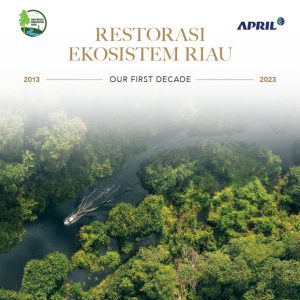 2023
2023RER has launched the ‘RER Special Report,’ which contains field stories of RER’s activities over the course of a decade. The report highlights RER’s commitment to large-scale forest protection, restoration, and active management in Riau for 10 years. Additionally, the baseline survey of Odonata (dragonflies and damselflies) has been completed by Dr. Rory Dow, a specialist in tropical Odonata species and a member of the IUCN Odonata Specialist Group, identifying a total of 100 odonata species on the Kampar Peninsula.
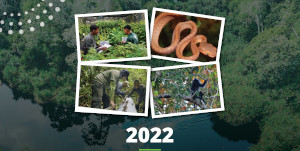 2022: Continuous Research and Learning
2022: Continuous Research and LearningThe Eco-Research Camp was host to over 40 domestic and international groups interested to learn more about the RER program. Both national and international researchers studying abroad benefitted from the Peat Lab facility; one PhD student from Kent University, UK assessing large mammal population trends in a human-modified landscape, one Masters student from Wageningen University, Netherlands comparing different restoration techniques. Four Masters students from the University of British Columbia, Canada documented the ecological, economic, and social aspects of fisherman on the Serkap river.
With FFI’s completion of the last baseline biodiversity and carbon stock survey in PT GAN on Kampar Peninsula and RER’s continuous monitoring of biodiversity via camera traps and field surveys, the total fauna and flora documented became 843 species, an increase of 138 species since 2016. This included 5 mammals, 5 amphibian/reptiles, 20 birds, 50 plants and 58 species of Odonata.
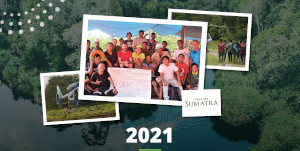 2021: Premiere of Frontier Sumatra
2021: Premiere of Frontier SumatraRER constructed a floating helipad and guard post at Tasik Tengah, a 7-hectare lake located at the center of the Kampar Peninsula to improve forest protection capabilities and provide safe and comfortable facilities for RER staff, researchers, and corporate guests to enjoy a firsthand experience at a remote location in the peat forest.
RER’s Carbon Project was validated and registered under VERRA voluntary Verified Carbon Standard (VCS) program with estimate to avoid more than 384 million tons of CO2e emissions during the 57-year project lifetime, potentially one of the world’s largest carbon avoidance projects applying REDD+ methodologies.
Frontier Sumatra, a documentary tells story about RER program was premiered on Discovery Asia in September 2021. Initial planning and production for the documentary began in 2018 that lead to an intensive month of filming in February 2020. Frontier Sumatra recounts the daily lives and challenges of the RER Rangers and staff to protect, assess, restore, and manage the peat forest, wildlife and people that rely on this ecosystem for their livelihoods and delivers the message that a pulp and paper company can not only produce from the landscape, but also protect it.
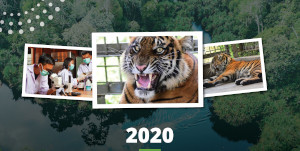 2020: Eco-Research Camp – Tropical Peatland Science Hub
2020: Eco-Research Camp – Tropical Peatland Science HubAfter 3-years of planning and 1.5-years of construction, RER’s Eco-Research Camp was completed and 48 RER staff took occupancy. The Eco-Camp also provides guest housing for 16 visitors, offering researchers and corporate stakeholders access to the remote wetland wilderness on the Kampar Peninsula and a detailed understanding of APRIL’s production-protection landscape approach.
In December, RER team supported the Government of Indonesia with the release of Corina, a critically endangered female Sumatran tiger in Kampar Peninsula and successfully tracked her movements and behaviour for 5-months using a GPS collar.
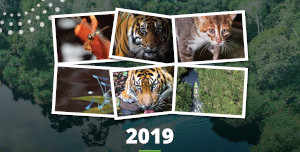 2019: Advancing in Biodiversity Monitoring
2019: Advancing in Biodiversity MonitoringRER collaborated with the IUCN Odonata Specialist Group to conduct the first baseline surveys on the Kampar Peninsula for dragonfly’s and damselfly’s resulting in the identification of 28 Odonata species, which some were first time identifications for Riau.
In support of the Government of Indonesia’s 2nd Sumatra Wide Tiger Survey, RER collaborated with SINTAS (Save the Indonesian Nature and Threatened Species) to conduct the first detailed field survey of Sumatran tiger presence on the Kampar Peninsula. Results from the 517,500 ha survey indicated that the Peninsula had one of the highest probabilities of tiger presence as compared to five other priority landscapes in Sumatra.
In the last 2.5 months of 2019, four separate Flat-headed cats, the wetland specialist, were recorded across three of the four RER concessions on the Kampar Peninsula.
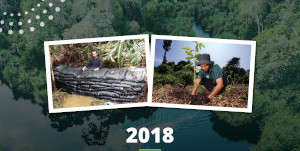 2018: Strong on Forest and Hydrological Restoration
2018: Strong on Forest and Hydrological RestorationRER initiated restoration on 58.2 ha of degraded forest, our largest accomplishment to date, and nearly doubling what has been accomplished in the previous four years. The 2018 achievement consisted of 28.3 ha of planting and 29.9 ha of assisted natural regeneration.
An additional 30 dams were constructed, closing 38.1 km from 13 canals. To date, RER has achieved 38% of its goal by closing 21 canals, totaling 65.4 km.
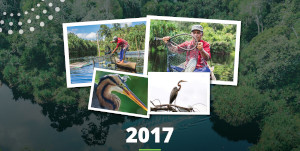 2017: Focusing on Community Relationships
2017: Focusing on Community RelationshipsRER employed 69 employees and 70 contracted rangers with 80% of the staff originating from the local community and/or Riau province. The RER program supported twenty families that harvest fish on the Serkap River to formalize a Fishing Group to ensure only sustainable fish harvest techniques were used. Additionally, RER began selling Madu Hutan Riau, a natural honey product provided by local collectors that climb 30-40 meters above the forest floor to harvest this natural bounty.
RER’s biodiversity monitoring and restoration work continued with camera trap monitoring and for the first time conducting the Asian Waterbird Census (AWC) that counted 200 individuals comprised of seven different waterbird species.
RER also constructed 17 dams to close old drainage canals in order to maintain peat soil moisture and minimize subsidence during the dry season.
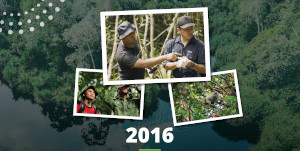 2016: RER Publishes Biodiversity Report of the Kampar Peninsula
2016: RER Publishes Biodiversity Report of the Kampar PeninsulaFFI completed the baseline biodiversity studies on 92,500 ha which provided information for RER to publish its first Summary Report on Biodiversity of the Kampar Peninsula, describing 524 plants and animals identified in the RER concessions.
BIDARA began implementing “Managing Land Without Slash and Burn” program with a local farmer group established in 2015, focusing on organic farming techniques and animal husbandry on the Kampar Peninsula.
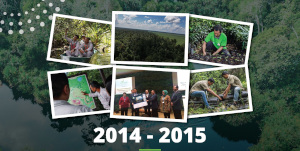 2014-15: The Beginning of the Actions
2014-15: The Beginning of the ActionsThe RER concession area expanded with three additional ecosystem restoration licenses (Sinar Mutiara Nusantara, The Best One Unitimber, Global Alam Nusantara) on Kampar Peninsula totaling 150,000 ha, thus completing the core protection zone on the Kampar Peninsula and Padang Island peat domes that are isolated from forest threats by the actively-managed production fiber plantation-ring.
The RER activities began with protecting the forest from new degradation and conducting baseline assessments that follow the High Conservation Value approach and Community, Climate and Biodiversity Standard that create net positive benefits for climate change mitigation for local communities and for biodiversity.
RER’s partners Fauna & Flora International (FFI) and BIDARA also initiated work on-the-ground. FFI deployed 225 camera traps on the Kampar Peninsula to inventory the fauna present in the peat landscape; measured peat depth and above-ground biomass and documented the ethnicity and well-being of surrounding communities.
The restoration activities began by trialing several dam construction techniques to close old drainage canals and planted native tree seedlings on 8.9 ha of highly degraded sites on the Kampar Peninsula.
At the UNFCCC COP 21 in Paris, Anderson Tanoto, Managing Director of RGE, announced that APRIL Group would invest US$100 million in conservation and restoration, which includes RER, over the next 10 years.
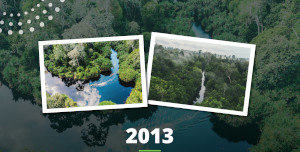 2013: Launch of the Restorasi Ekosistem Riau (RER) Initiative
2013: Launch of the Restorasi Ekosistem Riau (RER) InitiativeThe launch of the RER initiative, with APRIL’s two Ecosystem Restoration licenses (PT Gemilang Citra Nusantara) on Kampar Peninsula and Padang Island, was an important milestone in supporting Indonesia’s efforts to address deforestation, conserve biodiversity, restore degraded ecosystems, and promote sustainable development through a production-protection landscape approach.
